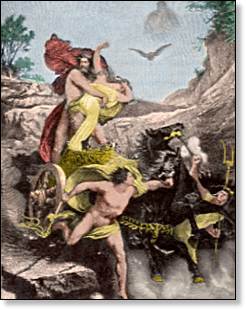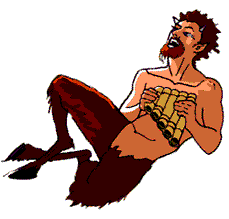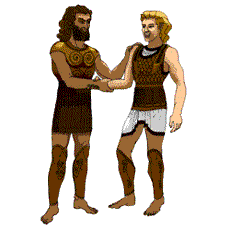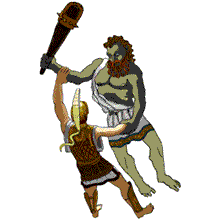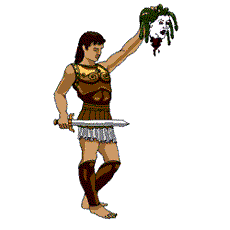Poseidon (puh-SYE-dun or poh-SYE-dun). Roman name Neptune. Poseidon was the god of the sea, earthquakes and horses. Although he was officially one of the supreme gods of Mount Olympus, he spent most of his time in his watery domain. Poseidon was brother to Zeus and Hades. These three gods divided up creation. Zeus became ruler of the sky, Hades got dominion of the Underworld and Poseidon was given all water, both fresh and salt.
 Although there were various rivers personified as gods, these would have been technically under Poseidon's sway. Similarly, Nereus, the Old Man of the Sea, wasn't really considered on a par with Poseidon, who was known to drive his chariot through the waves in unquestioned dominance. Poseidon had married Nereus's daughter, the sea-nymph Amphitrite.
Although there were various rivers personified as gods, these would have been technically under Poseidon's sway. Similarly, Nereus, the Old Man of the Sea, wasn't really considered on a par with Poseidon, who was known to drive his chariot through the waves in unquestioned dominance. Poseidon had married Nereus's daughter, the sea-nymph Amphitrite.
 In dividing heaven, the watery realm and the subterranean land of the dead, the Olympians agreed that the earth itself would be ruled jointly, with Zeus as king. This led to a number of territorial disputes among the gods. Poseidon vied with Athena to be patron deity of Athens. The god demonstrated his power and benevolence by striking the Acropolis with his three-pronged spear, which caused a spring of salt water to emerge. Athena, however, planted an olive tree, which was seen as a more useful favor. Her paramount importance to the Athenians is seen in her magnificent temple, the Parthenon, which still crowns the Acropolis. The people of Athens were careful, all the same, to honor Poseidon as well.
In dividing heaven, the watery realm and the subterranean land of the dead, the Olympians agreed that the earth itself would be ruled jointly, with Zeus as king. This led to a number of territorial disputes among the gods. Poseidon vied with Athena to be patron deity of Athens. The god demonstrated his power and benevolence by striking the Acropolis with his three-pronged spear, which caused a spring of salt water to emerge. Athena, however, planted an olive tree, which was seen as a more useful favor. Her paramount importance to the Athenians is seen in her magnificent temple, the Parthenon, which still crowns the Acropolis. The people of Athens were careful, all the same, to honor Poseidon as well.
 Poseidon was father of the hero Theseus, although the mortal Aegeus also claimed this distinction. Theseus was happy to have two fathers, enjoying the lineage of each when it suited him. Thus he became king of Athens by virtue of being Aegeus's son, but availed himself of Poseidon's parentage in facing a challenge handed him by King Minos of Crete. This monarch threw his signet ring into the depths of the sea and dared Theseus to retrieve it. The hero dove beneath the waves and not only found the ring but was given a crown by Poseidon's wife, Amphitrite.
Poseidon was father of the hero Theseus, although the mortal Aegeus also claimed this distinction. Theseus was happy to have two fathers, enjoying the lineage of each when it suited him. Thus he became king of Athens by virtue of being Aegeus's son, but availed himself of Poseidon's parentage in facing a challenge handed him by King Minos of Crete. This monarch threw his signet ring into the depths of the sea and dared Theseus to retrieve it. The hero dove beneath the waves and not only found the ring but was given a crown by Poseidon's wife, Amphitrite.
 Poseidon was not so well-disposed toward another famous hero. Because Odysseus blinded the Cyclops Polyphemus, who was Poseidon's son, the god not only delayed the hero's homeward return from the Trojan War but caused him to face enormous perils.
Poseidon was not so well-disposed toward another famous hero. Because Odysseus blinded the Cyclops Polyphemus, who was Poseidon's son, the god not only delayed the hero's homeward return from the Trojan War but caused him to face enormous perils.
 Poseidon similarly cursed the wife of King Minos. Minos had proved his divine right to rule Crete by calling on Poseidon to send a bull from the sea, which the king promised to sacrifice. Poseidon sent the bull, but Minos liked it too much to sacrifice it. So Poseidon asked Aphrodite, the goddess of love, to make Minos's queen, Pasiphae, fall in love with the bull. The result was the monstrous Minotaur, half-man, half-bull.
Poseidon similarly cursed the wife of King Minos. Minos had proved his divine right to rule Crete by calling on Poseidon to send a bull from the sea, which the king promised to sacrifice. Poseidon sent the bull, but Minos liked it too much to sacrifice it. So Poseidon asked Aphrodite, the goddess of love, to make Minos's queen, Pasiphae, fall in love with the bull. The result was the monstrous Minotaur, half-man, half-bull.
 As god of horses, Poseidon often adopted the shape of a steed. It is not certain that he was in this form when he wooed Medusa. But when Perseus later killed the Gorgon, the winged horse Pegasus sprang from her severed neck.
As god of horses, Poseidon often adopted the shape of a steed. It is not certain that he was in this form when he wooed Medusa. But when Perseus later killed the Gorgon, the winged horse Pegasus sprang from her severed neck.
 Poseidon sometimes granted the shape-shifting power to others. And he ceded to the request of the maiden Caenis that she be transformed into the invulnerable, male warrior Caeneus.
Poseidon sometimes granted the shape-shifting power to others. And he ceded to the request of the maiden Caenis that she be transformed into the invulnerable, male warrior Caeneus.
|
|
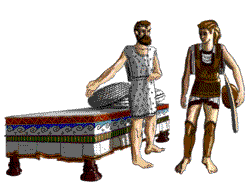
|
Procrustes and his magical bed.
By Guy Fiore.
| |
|
Procrustes (proh-KRUS-teez). A host who adjusted his guests to their bed. Procrustes, whose name means "he who stretches", was arguably the most interesting of Theseus's challenges on the way to becoming a hero. He kept a house by the side of the road where he offered hospitality to passing strangers, who were invited in for a pleasant meal and a night's rest in his very special bed. Procrustes described it as having the unique property that its length exactly matched whomsoever lay down upon it. What Procrustes didn't volunteer was the method by which this "one-size-fits-all" was achieved, namely as soon as the guest lay down Procrustes went to work upon him, stretching him on the rack if he was too short for the bed and chopping off his legs if he was too long. Theseus turned the tables on Procrustes, fatally adjusting him to fit his own bed.
|
| Proetus (proh-EE-tus). King of Tiryns, brother of Perseus's grandfather, King Acrisius of Argos. When his wife falsely accused Bellerophon of making amorous advances, Proetus sent the hero to King Iobates of Lycia with sealed instructions that he be put to death on arrival. Iobates thought to accomplish this by sending him after the Chimaera, but Bellerophon killed the beast instead. On another occasion, the daughters of Proetus were driven mad by Hera and roamed the countryside in a frenzy thinking they were cows.
|
|
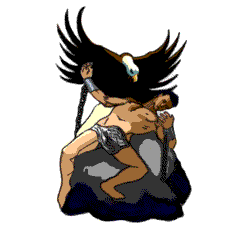
|
Prometheus tormented by the eagle.
By Guy Fiore.
| |
| |
Prometheus (proh-MEE-thee-us or proh-MEE-thyoos). Titan; benefactor of humankind. Prometheus stole fire from the gods and gave it to mortals, carrying it away from Mount Olympus in a fennel stalk (a method of transporting fire that was used down into historical times). As a consequence, Zeus chained Prometheus to a rock where each day an eagle pecked out his liver (which regenerated itself each night).
| | | |

